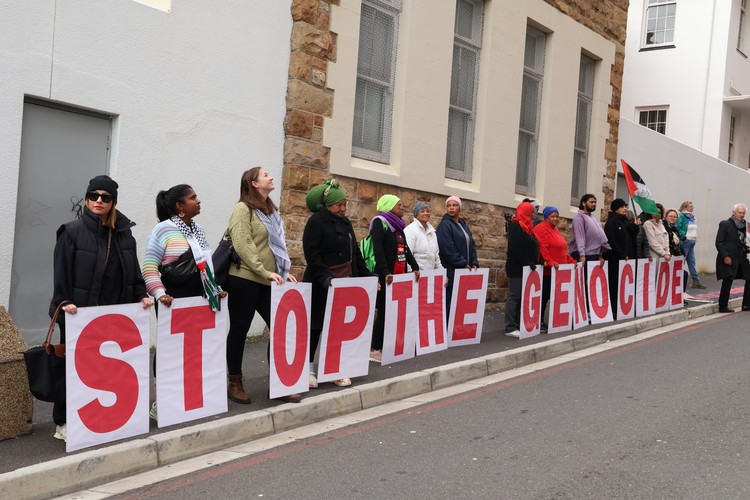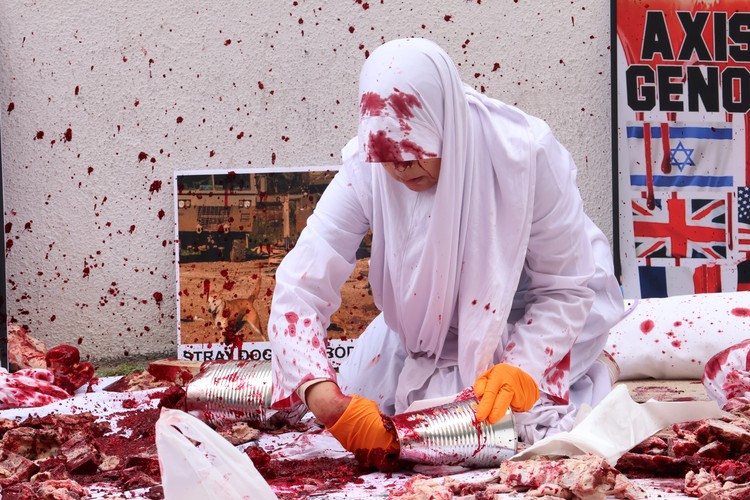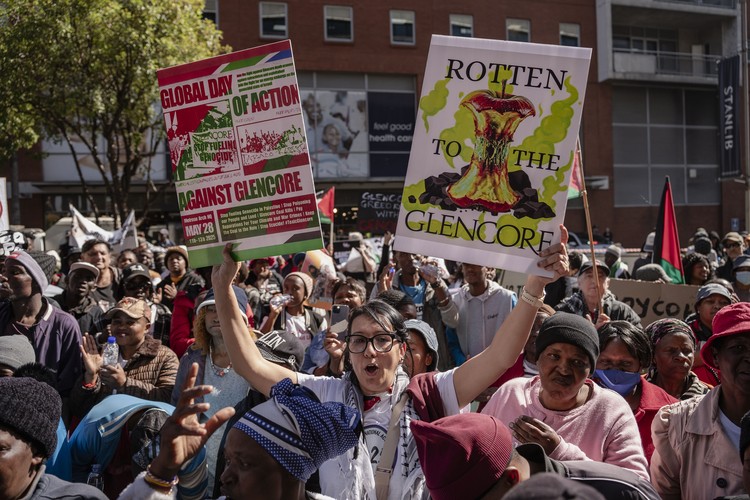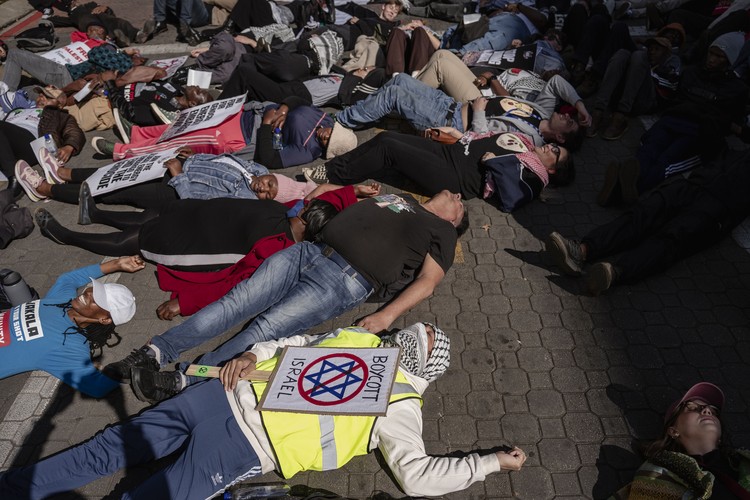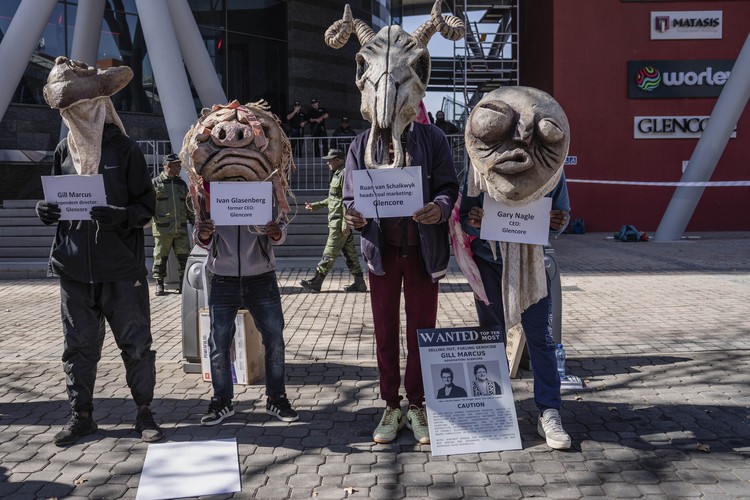Protests against Germany and Glencore mark Namibian Genocide Remembrance Day
Events in Cape Town and Johannesburg drew attention to the war in Gaza
Dozens of protesters held up posters outside the German Consulate in Cape Town on Thursday morning to mark Namibia’s first Genocide Remembrance Day. Their protest also called for an end to the genocide of the Palestinian people. Photo: Matthew Hirsch
- Protesters gathered in Cape Town and Johannesburg on Wednesday morning to mark Namibia’s first Genocide Remembrance Day.
- The day commemorates the mass murders of more than 70,000 Herero and Nama people by Germany between 1904 and 1908.
- At the picket in Cape Town, organised by the Palestine Solidarity Campaign (PSC), protesters called for Germany to impose punitive measures against Israel for the “genocide unfolding in Palestine”.
- In Johannesburg, protesters picketed outside Glencore’s head offices to demand the coal-giant end sale to Israel amid its war with Palestine.
Scores of protesters gathered in Cape Town and Johannesburg on Wednesday morning to mark Namibia’s first Genocide Remembrance Day.
Sometimes called “Germany’s forgotten genocide,” the day commemorates the mass murders of more than 70,000 Herero and Nama people by Germany between 1904 and 1908.
Under the Nazi regime Germany also committed genocide in World War II, murdering over 6-million Jewish people and hundreds of thousands of Roma people.
Cape Town 
About 50 people gathered outside the German Consulate in Cape Town with large banners which read: “Stop the Genocide”. Some people waved Palestinian flags and posters which read: “Boycott apartheid Israel”. The protesters criticised Germany for supporting Israel’s war in Gaza.
The protest was organised by the Palestine Solidarity Campaign (PSC).
In a statement, the PSC accused Germany of being on the wrong side of history. “Zionism is not a religion. It is not above critique. It is a settler colonial ideology that has produced a regime of apartheid and an open-ended project of ethnic cleansing against the Palestinian people, one that has now reached genocidal proportions. The International Court of Justice has found a plausible case of genocide.”
Judy Favish, a member of South African Jews for Free Palestine (SAJFP), told protesters: “Finally, we are starting to see a couple of countries in Europe, as a result of our protests, starting to threaten that they will impose sanctions if Israel doesn’t allow aid into Palestine. Germany is quiet. Germany is doing nothing.”
Performance activist Naima Omar, dressed in all white, is surrounded by blood-like stained bones and clothing to symbolise Palestinians being killed by Israel. Photo: Matthew Hirsch
Protester Sarah Oosthuizen described herself as a South African German. She joined the picket in solidarity with the protest “in commemoration of the German genocide in Namibia as well as the ongoing complicity that Germany has in the genocide unfolding in Palestine”.
At the end of the protest, a memorandum from the Palestine Solidarity Campaign was handed over to a representative from the German Consulate. Demands included that Germany must impose concrete punitive measures against Israel, including arms embargoes, and that it must stop equating anti-zionism with antisemitism.
The German embassy’s comment will be added once received.
Johannesburg
Protesters gather outside the head office of coal giant Glencore to demonstrate against the mining giant’s coal sales to Israel. Photo: Ihsaan Haffejee
About 300 protesters gathered outside the head office of Switzerland-based multinational Glencore to demonstrate against the mining giant’s coal sales to Israel.
The protest was led by the South African BDS Coalition Energy Embargo Campaign. It is made up of pro-Palestine solidarity groups, environmental justice organisations, trade unions and mining affected communities.
Protesters claim that Glencore’s supply of coal to Israel is powering its energy infrastructure and enabling the continued genocide against the people of Gaza.
Glencore is the world’s largest mining company by revenue, earning well over $200 billion in the 2024 financial year from its mining activities around the world.
The protest coincided with Glencore’s Annual General Meeting (AGM) in Switzerland and was part of a series of coordinated actions around the world in places where Glencore operates.
At one point protesters all laid down in the road outside the Glencore head office in Johannesburg. Photo: Ihsaan Haffejee
In April, GroundUp reported that cargo ships filled with South African coal had left the Richards Bay Coal Terminal and were on their way to Israel.
Those protesting outside Glencore’s head office said that the government’s failure to impose a trade embargo on the sale of coal to Israel is hypocritical in light of South Africa’s genocide case against Israel at the International Court of Justice.
“We are calling for an energy embargo. If countries stop selling their coal, oil and jet fuel to Israel it will not be able to continue bombing people. South Africa’s failure to call for an energy embargo on sales to Israel is making us look like hypocrites,” said Roshan Dadoo, Coordinator of the SA BDS Coalition.
No representative from Glencore made themselves available to address the protesters or listen to their demands.
During Glencore’s 2024 annual general meeting, management was asked by a shareholder if the company is conducting human rights assessments on the use of the coal that it sells to Israel. Kalidas Madhavpeddi, board chairman, said it was impossible to answer the question as the company supplies coal to many countries around the world. The CEO of Glencore, South African Gary Nagle, refused to further comment on the shareholder’s question.
Protesters wore large masks to depict the leadership of the Swiss based mining giant Glencore. Photo: Ihsaan Haffejee
Support independent journalism
Donate using Payfast

Don't miss out on the latest news
We respect your privacy, and promise we won't spam you.
Next: One in four South Africans don’t have enough food. Activists call for action
Previous: Union members march in Durban, demanding permanent jobs
© 2025 GroundUp. This article is licensed under a Creative Commons Attribution-NoDerivatives 4.0 International License.
You may republish this article, so long as you credit the authors and GroundUp, and do not change the text. Please include a link back to the original article.
We put an invisible pixel in the article so that we can count traffic to republishers. All analytics tools are solely on our servers. We do not give our logs to any third party. Logs are deleted after two weeks. We do not use any IP address identifying information except to count regional traffic. We are solely interested in counting hits, not tracking users. If you republish, please do not delete the invisible pixel.

